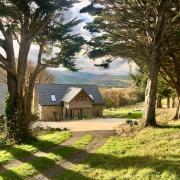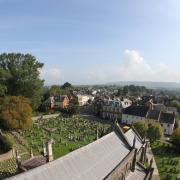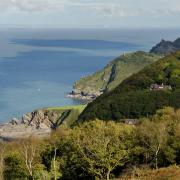From dusk safaris to atmospheric boat trips this astral celebration will be out of this world

Night is falling on an autumnal evening and most us are retreating indoors, but high up on Exmoor nocturnal gatherings are taking place. Small groups of people are meeting to explore a moonlit world.
This year marks the fourth annual Exmoor Dark Skies Festival. A host of events and activities take place over two weeks in October, all of which celebrate the moor’s designation as an International Dark Skies Reserve.
It’s very rare to look up and see a truly dark night sky, due to surrounding light pollution, but the Exmoor landscape is unique in that it’s sufficiently free of man-made light sources and so, on a clear night, it’s a perfect place to go stargazing.
The festival is organised by Exmoor National Park Authority, working with individuals and businesses on the moor. It includes many opportunities to learn about the stars and go out on to the moor to see them. Even on a cloudy evening, it’s a fascinating place to explore.
Festival organiser Katrina Munro says: “It’s exhilarating; even if the weather is dreadful it’s an experience. In the past we’ve had 85 people turning out for a ranger-guided walk up Dunkery Beacon when the weather’s been dreadful. But it’s something a bit different, even seeing the ponies and deer out at night.”
Katrina is thrilled to be able to offer a full programme of events this year, despite the coronavirus situation. They range from astronomy talks, dusk safaris, night walks, pub suppers and foodie feasts to yoga under the stars. Every precaution has been taken, with numbers limited and social distancing measures in place. It’s led to some more unusual events on this year’s programme, one of which is a dark skies adventure by boat – an exclusive trip along the Exmoor coastline for up to eight people from the same group.
“He’s a very experienced boat skipper, and so understands all about the night sky,” says Katrina. “It will be very atmospheric, going on a boat at night, hugging the coastline along Porlock.”
Other exclusive trips for small groups include Land Rover ranger safaris, or there’s the option of staying on the moor for a few days with a wellbeing retreat, or one of the short breaks being offered at various hotels, farms and B&Bs.
Professor Roger Davies, an astrophysicist and cosmologist from Oxford University, will be giving presentations, some of which include a special supper and the park’s own rangers are leading night-time walks and sharing some of their specialist wildlife knowledge – from ponies to moths.
Stargazing appeals to all age groups, says Katrina, and for children it reveals “a whole new world”, one which they learn about at school but don’t often get the chance to see.
“It’s the tranquility, the darkness and the possibility… to be out on a clear night with thousands and thousands of stars is spectacular and mesmerising,” she says.
Competition time
The festival is running a photography competition, Exmoor At Night, with prizes including telescopes, books, gin, coffee and magazines. There are four categories, three of which have classes for under 16s and 16+. The deadline for entries is 2 November.
The Exmoor Dark Skies Festival runs from 16 to 31 October. Details of events and activities, along with information about the photography competition can be found online or from Exmoor National Park centres at Lynmouth, Dunster and Dulverton.
There will also be online events focused on stargazing, nocturnal wildlife and the importance of dark skies. Follow #ExmoorDSF on social media for updates or sign up to Exmoor National Park’s Dark Skies newsletter on the website.
Have you joined the Devon Life Facebook page yet?



























